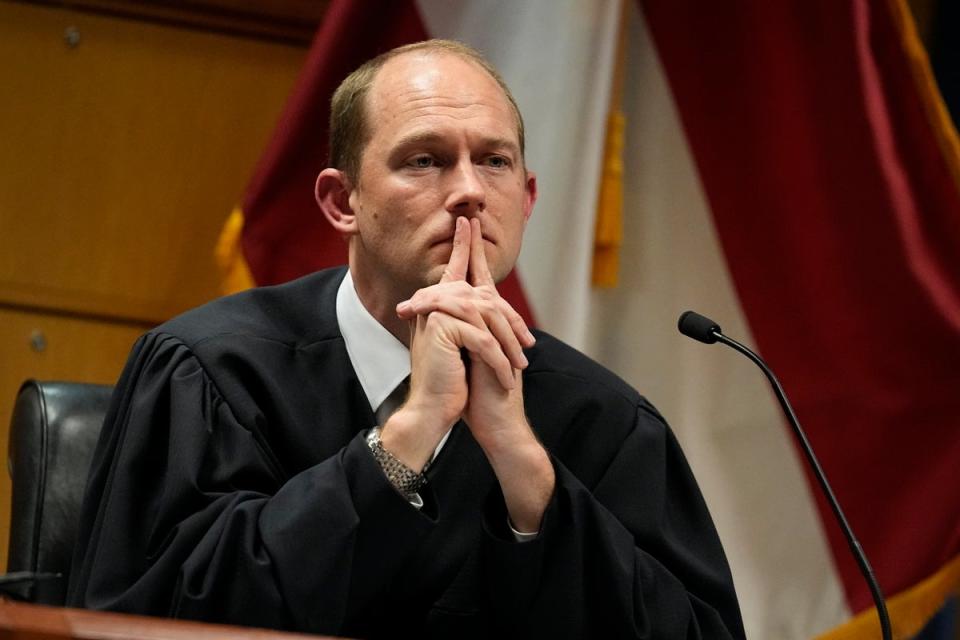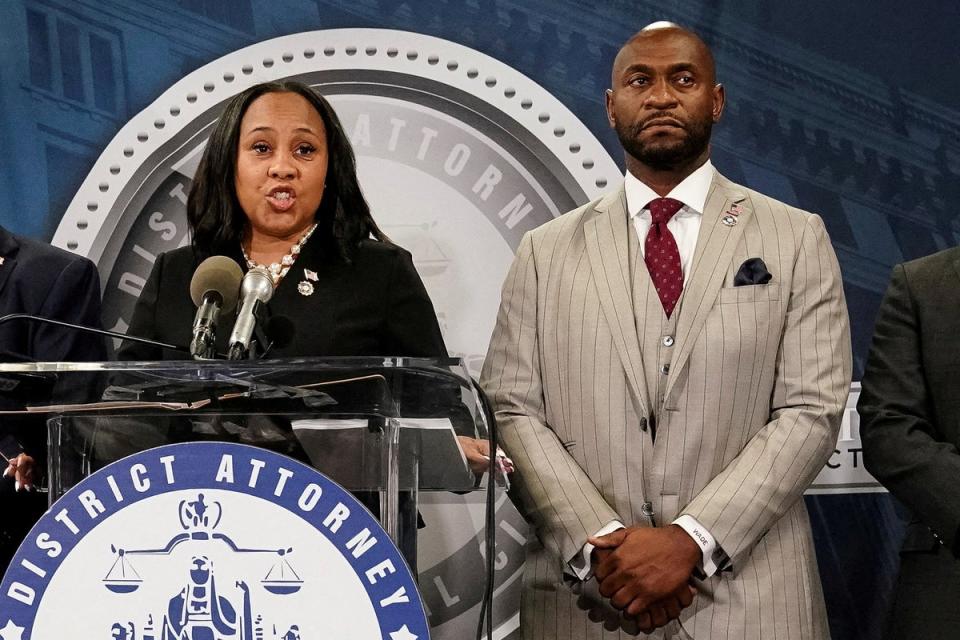Fani Willis can stay on Donald Trump’s election interference case, judge rules
Fulton County district attorney Fani Willis will be allowed to continue to criminally prosecute Donald Trump and more than a dozen co-defendants who are accused of mounting a “criminal enterprise” to unlawfully overturn Georgia’s election results in 2020.
The judge overseeing that case has rejected efforts from Mr Trump and his allies to disqualify the district attorney following allegations of misconduct with a prosecutor she hired to lead the case.
In his 23-page decision on Friday, Fulton County Superior Court Judge Scott McAfee wrote the defendants “failed to meet their burden” in proving a “conflict of interest” that would require her removal, but he noted that any appearance of “impropriety” could necessitate Ms Willis or prosecutor Nathan Wade withdrawing for the case to move forward.
Hours later, Mr Wade announced his resignation.
“The furtherance of the rule of law and democracy is and has always been the North Star of our combined efforts in the prosecution of those who are alleged to have attempted to overthrow the results of Georgia's 2020 presidential election,” he wrote in a letter to Ms Willis on Friday.
He offered his reisgnation “in the interest of democracy, in dedication to the American public, and to move this case forward as quickly as possible,” he added.
“I am proud of the work our team has accomplished in investigating, indicting, and litigating this case,” he wrote. “Seeking justice for the people of Georgia and the United States, and being part of the effort to ensure that the rule of law and democracy are preserved, has been the honor of a lifetime.”
Ms Willis accepted his resignation, writing in response that Mr Wade and his family have endured threats and “unjustified attacks in the media and in court” on his reputation after taking on the case against the former president.
“I will always remember – and will remind everyone – that you were brave enough to step forward and take on the investigation and prosecution of the allegations that the defendants in this case engaged in a conspiracy to overturn Georgia’s 2020 presidential election,” she wrote.
“Others who were considered were understandably concerned for the safety of themselves and their families that would arise from their acceptance of your role,” she added. “You were the one who had the courage to accept the role, even though you did not seek it.”
Attorneys for Mr Trump and his co-defendants accused Ms Willis of financially benefiting from the case against the former president by hiring a lead prosecutor with whom she was romantically involved.
Mr Wade and Ms Willis have acknowledged their prior relationship, but they have repeatedly testified that they started dating after he was hired, split their expenses, and that the relationship ended last summer before an indictment.

But, the judge wrote, “an odour of mendacity remains.”
While the court is not under “an obligation to ferret out every instance of potential dishonesty from each witness or defendant ever presented in open court”, there remain “reasonable questions” about the prosecutors’ relationship, according to Judge McAfee.
Neither dismissing the case nor removing an elected official from her post would solve them, he wrote. Instead, he gave Ms Willis’s office two options: either step aside and refer the case to a prosecuting attorneys’ council for re-assignment, or Mr Wade can withdraw.
Mr Wade’s departure would allow the case “and the public” to “move forward without his presence or remuneration distracting from” the proceedings, according to Judge McAfee’s order.
“As long as Wade remains on the case, this unnecessary perception will persist,” he wrote.
Steve Sadow, Mr Trump’s lead attorney in the Fulton County case, said in a statement on Friday that the court “did not afford appropriate significance to the prosecutorial misconduct” alleged by the defendants.
“We will use all legal options available as we continue to fight to end this case, which should never have been brought in the first place,” Mr Sadow said.
In three days of hearings over two weeks, Judge McAfee heard intimate details of Ms Willis’s personal life – including testimony from the district attorney herself, as well as from Mr Wade and her father – while “star” witnesses for the defence failed to wring out damning details about them.
“You’re confused,” Ms Willis told defence attorney Ashleigh Merchant, who brought forward allegations against Ms Willis and Mr Wade on behalf of her client, Mike Roman, a Trump campaign aide in Georgia.
“You think I’m on trial. These people are on trial for trying to steal an election in 2020,” she said. “I’m not on trial. No matter how hard you try to put me on trial.”
Lawyers representing the district attorney previously argued that the case rested on the attempts from Mr Trump and his allies to publicly “impugn” and smear the prosecutor as political payback, and that the testimony and documents presented to the court showed “no evidence that the district attorney has financially benefited at all”.
The allegations against Ms Willis relied on salacious rumours, gossip and innuendo designed to “embarrass and harass” her, all while indefinitely delaying the criminal case against Mr Trump and his allies, lawyers for Ms Willis argued.
Ms Merchant and other defence attorneys accused Ms Willis of lying on the stand, and defence witnesses at the hearings were propped up by attorneys to refute the prosecutor’s claims.
Robin Bryant-Yeartie, a former friend and co-worker of Ms Willis, testified that there was “no doubt” that the now-former couple began dating in late 2019 after they met at a conference, and before Mr Wade was hired on the case.
Ms Merchant also called Terrence Bradley, a former law partner of Mr Wade, and who reluctantly took the stand to face questions from Ms Merchant about text messages she shared with him about the allegations.
But defence attorneys were unable to draw any conclusive evidence from their supposed “star” witnesses, and lawyers for Ms Willis questioned their motives and suggested they were more likely “disgruntled” former friends and colleagues.
“There’s absolutely no evidence that the defendants in this case, their due process rights have been harmed in absolutely any way,” prosecutor Adam Abbate said during closing statements. “Zero evidence.”
Judge McAfee’s order on Friday notes that his finding is “no means an indication that the court condones this tremendous lapse in judgement or the unprofessional manner of the district attorney’s testimony during the evidentiary hearing.”
“Whether this case ends in convictions, acquittals, or something in between, the result should be one that instills confidence in the process,” Judge McAfee wrote.
“A reasonable observer unburdened by partisan blinders should believe the law was impartially applied, that those accused of crimes had a fair opportunity to present their defences, and that any verdict was based on our criminal justice system’s best efforts at ascertaining the truth. Any distractions that detract from these goals, if remedial under the law, should be proportionally addressed.”

The judge’s decision comes after he dismissed several charges against Mr Trump and five of his co-defendants that stemmed from their alleged pressure campaign to solicit state officials to violate their oaths of office and subvert Georgia’s election results to overturn his 2020 presidential election loss.
Judge McAfee, however, did not toss out the central racketeering charge facing all the defendants, nor did he dismiss the “overt acts” that support their alleged scheme to pressure Georgia lawmakers and secretary of state Brad Raffensperger.
Ms Willis can re-open an indictment against them. She can also appeal the judge’s decision.
The former president and more than a dozen co-defendants are accused of mounting a statewide effort to reverse his election loss, including a so-called “fake elector” scheme to falsely assert his victory in a state he lost to Joe Biden, seizing voting machines, intimidating election workers, and pushing the state’s top election official to “find” votes he would need to win.
Four of Mr Trump’s original co-defendants in the Fulton County case – including attorneys Kenneth Chesebro, Jenna Ellis and Sidney Powell – pleaded guilty last year after reaching plea deals with prosecutors.
